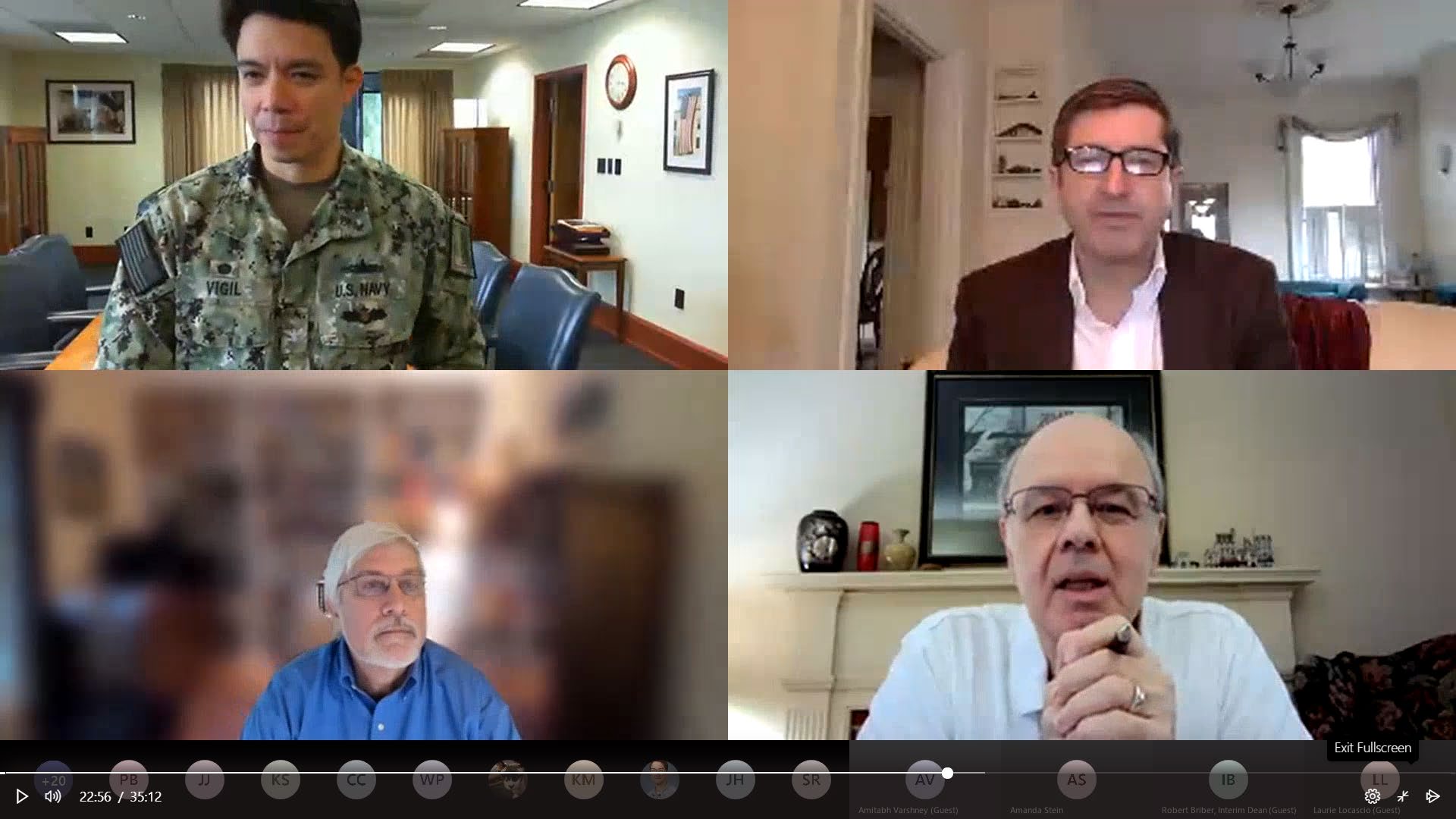Press Release
QTC, NRL Announce New Partnership to Spur Quantum Innovation
The University of Maryland's Quantum Technology Center (QTC) entered today into an Education Partnership Agreement with the U.S. Naval Research Laboratory (NRL) to identify and pursue opportunities related to quantum technology research.
FOR IMMEDIATE RELEASE September 1, 2020
CONTACT:
Kara Stamets
301 405 4471
stametsk@umd.edu

U.S. Naval Research Laboratory Commanding Officer, Capt. Ricardo Vigil (top left), and NRL Director of Research, Bruce Danly, Ph.D. (bottom left), and Gerald M. Borsuk, Ph.D., (bottom right) associate director of research for NRL’s systems directorate joined University of Maryland’s Ronald Walsworth, Ph.D, director, Quantum Technology Center for a virtual signing ceremony Sept. 1. The partners are entering into an agreement to identify and pursue opportunities for high quality educational outreach, knowledge sharing, and collaboration in developing quantum technologies and understanding the science that makes them possible. As the corporate laboratory of the Navy, NRL has a long and fruitful relationship with industry and academia. U.S. Navy photo by Paul Cage.
COLLEGE PARK — The Quantum Technology Center (QTC)—a joint venture between the University of Maryland’s A. James Clark School of Engineering and the College of Computer, Mathematical, and Natural Sciences (CMNS)—entered today into an Education Partnership Agreement with the U.S. Naval Research Laboratory (NRL) to identify and pursue opportunities related to quantum technology research.
The new partnership with NRL is specifically focused on advancing quantum information science for applications that are relevant to the warfighter, and will involve exchanges of expertise and samples; collaborations in experimental, theoretical, and educational work; mutual research proposals; and the exchange of researchers.
"The University of Maryland is excited to partner with the U.S. Naval Research Laboratory to explore the diverse applications of quantum technologies," said Dr. Laurie Locascio, vice president for research at UMD.
Launched in 2019, QTC capitalizes on the university’s strong research programs and partnerships in quantum science and systems engineering, and pursues collaborations with industry and government labs to help take promising quantum advances from the lab to the marketplace. QTC has a long rooted history of working with the Department of Defense Research Labs, as QTC’s founding partner is the Combat Capabilities Development Command (CCDC) Army Research Laboratory.
Quantum technology is making a huge impact in industry and government sectors, and the partnership between UMD and NRL will help move critical technologies forward.
“Research in quantum information science and technologies has the potential to bring new warfighting capabilities to the U.S. Navy and Marine Corps as well as to provide benefits to society at large,” said Gerald M. Borsuk, Ph.D., associate director of research for the systems directorate at NRL. “We are excited about working with the Quantum Technology Center at the University of Maryland to advance leading edge quantum technologies. We share a mutual commitment to providing students and faculty with high quality educational outreach, knowledge sharing, and research opportunities.”
Both the QTC and NRL aim to build and improve STEM educational and research capacities, and provide resources and equipment for research activities. There have been collaborations and joint proposals between these groups in recent years, particularly in work on solid state systems. Moving forward, future interactions are expected to involve work on quantum dots and defects, and on systems for quantum memory and networking, with a goal to advance the scaling and integration of quantum technologies.
“Quantum technology is developing rapidly, and many organizations are quickly getting involved. We are thrilled to collaborate with NRL to strengthen the current research and training activities within QTC, expand our research in areas such as machine learning and quantum networking, and notably, accelerate realization of the quantum internet,” said Ronald Walsworth, founding director of the QTC and UMD professor of electrical and computer engineering and physics.
The partners are also interested in collaborating on technologies associated with creating and implementing a quantum internet network. This research would involve quantum memory, quantum repeaters and routers, as well as associated classical network theory and associated implementations. Another area of interest to both QTC and NRL include defect states in semiconductors, such as diamond and silicon carbide, for opportunities in networking and in sensing, particularly magnetometry.
“QTC translates quantum science into new capabilities and technologies for real world applications. This partnership gives QTC, UMD and the Navy the opportunity for joint research to advance quantum technology for the Navy and will help prepare a workforce trained in this critical area,” said Walsworth.
About the University of Maryland Quantum Technology Center (QTC)
QTC was created at the University of Maryland, College Park through a partnership with the A. James Clark School of Engineering, the College of Computer, Mathematical, and Natural Sciences, and the CCDC-Army Research Laboratory to innovate, translate, and educate in quantum technology, with a focus on real-world applications and training the next generation of quantum leaders.